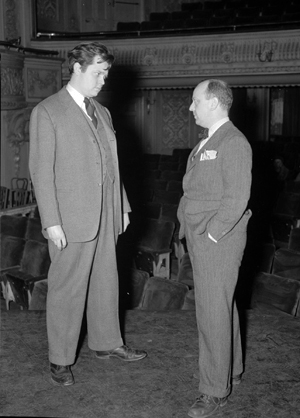
About this Project
The Works Progress Administration (WPA) Oral Histories Collection represents the most complete, discoverable documentation of individuals involved in the Federal Arts Projects during the Great Depression in the 1930s. The interviews were conducted primarily between 1975 and 1984. All were recorded on magnetic tape (both open-reel and compact cassette), then the industry standards for sound capture. Nearly all, if not all, of the interviewees are now deceased, but their memories of this time in American history were captured, many in sharp detail, and today are preserved with the help of this project. As is well documented, magnetic tape degrades over time, and that degradation accelerates as the format ages or experiences adverse environmental conditions.
Magnetic tapes were not created for long-term use, and are susceptible to sticky-shed syndrome, signal loss, and other integrity challenges. Even in the best storage conditions, the materials from which tapes are manufactured are themselves prone to degradation due to long-term storage. As magnetic tape begins to degrade, the magnetic particles containing the recorded information themselves degrade, and this information is lost. This process is irreversible. The cassettes tapes were stored in the original Special Collections stacks area of Fenwick Library from 1975 to 2016, an area that experienced temperature and humidity swings. In 2016, the tapes were moved along with the rest of the special collections to new, stable climate stacks area.
George Mason University Libraries Special Collections Research Center (SCRC) received a Council on Library & Information Resources (CLIR) Recordings at Risk grant in Fall 2019 to digitize the nearly 200 interviews with people involved in WPA arts units: the Federal Theatre Project (including the notable Black Theatre projects), Federal Arts Project, Federal Music Project, and Federal Writers’ Project. Recordings at Risk is a national program administered by CLIR to support the preservation of rare and unique audiovisual materials through digital reformatting to mitigate the effects of physical degradation and obsolescence.
In December 2019, the tapes were inventoried, packed, and shipped to media conservation vendor, The Media Preserve. There, the following digital files were for each tape were produced via playback: a 24/96 Broadcast Wav File (BWF) archival master, a 16/44 BWF mezzanine copy, and a streaming copy (MP3 at 192 kbps). MD5 checksums were run for all digital files created, and the tapes and tape cases were all photographed. To complicate matters, nearly all of the interviews had more than one audio file associated with them. These multiple files were stitched together to create a single file using the audio editing tool, Audacity. SCRC staff digitized the 165 originally typewritten transcripts, and created over 30 transcripts directly from the audio files by on-line vendor Temi Transcription Services, using AI. The SCRC Technology and Exhibitions Archivist managed all digitization processes, stitched the audio files together, and conducted the majority of cleanup of the transcripts. University Libraries staff from SCRC and the Access and Resource Management Division, assisted in the clean-up of the remaining transcripts.
The Voices of the WPA site was created by the Digital Developer in University Libraries’ Digital Strategies and Systems (DSS) and is maintained by DSS. This site uses the Hyperaudio tool to provide real-time audio-transcript synchronization and Elasticsearch to enable text searching within the oral history transcripts. Members of the Access and Resource Management Division, Metadata Services created metadata for the recordings to be used in the site. Due to the COVID-19 Pandemic, an extension of six months was requested and granted, and the site completed in Spring 2021.
The interview files have been reviewed for all relevant permissions. Of the 301 interviews (recoded on 427 cassette tapes and about 70 open-reel tapes), there are 201 interviews with signed deeds of gift. A detailed finding aid (https://scrc.gmu.edu/finding_aids/wpaoh.html) and a catalog record for the collection are available online. Previously only accessible via duplication to onsite and offsite researchers, based on permissions and the quality of the cassettes, the Voices of the WPA site now allows anyone to listen, download, and share the stories and memories of the actors, designers, dancers, directors, writers, musicians, and others whose talents and personalities infused the arts and entertained millions between 1935-1939.
The SCRC would especially like to thank the following University Libraries staff and students for their dedicated work on this project:



